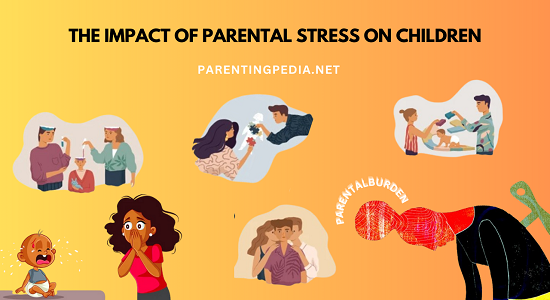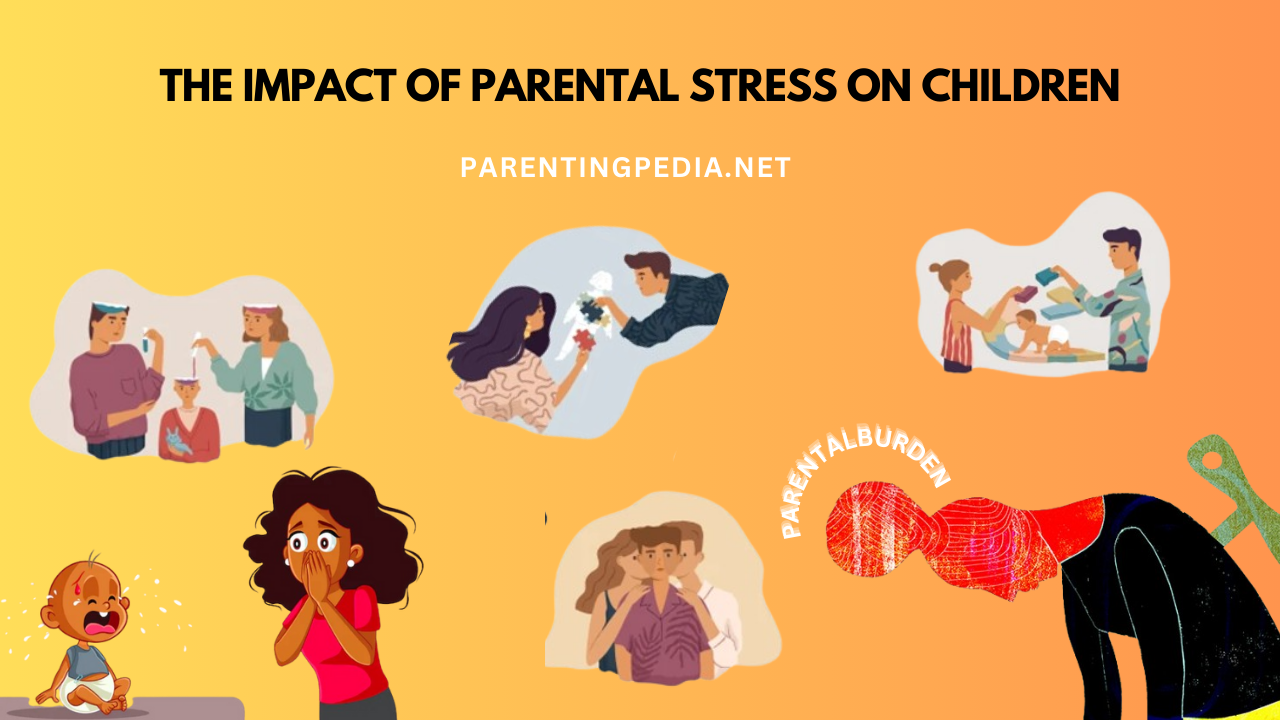Parenting is a demanding role, and stress is an inevitable part of the journey. Whether it arises from work pressures, financial concerns, relationship issues, or health challenges, parental stress can have far-reaching consequences. While stress is a normal response to life challenges, it can effect parent-child dynamics, thus, having impact on children emotional, psychological, and even physical well-being. This article explores the impact of parental stress on children, how it affects them and strategies to reduce its adverse effects.
What is Parental Stress?
Parental stress is the feeling of being overwhelmed, frustrated, or worried due to the demands of parenting. It can come from different sources such as:
Work Pressure – Balancing job and family life both at same time can be difficult for parents.
Financial Problems – Struggling to meet household expenses also adds to parental stress.
Relationship Issues – Conflicts between parents or lack of support can increase tension.
Health Problems – Physical or mental health issues in the family can create additional challenges.
Parenting Challenges – Managing children’s behavior, education, or health can be stressful for parents.
How Parental Stress Affects Children?
Children are very observant and sensitive to their parents emotions. When parents are stressed, children often notice it, even if parents try to hide it. Here are some ways parental stress can impact children:
1. Emotional Impact On Children
Anxiety and Worry – Children may sense their parents stress and start feeling anxious themselves. They might worry about things they don’t fully understand, like financial problems or arguments between parents.
Sadness or Low Mood – Seeing a stressed or upset parent can make children feel sad or helpless.
Feeling Responsible – Some children might think they are the reason for their parents stress, which can lead to guilt in them.
2. Behavioral Problems In Children
Acting Out – Some children express their stress by misbehaving, being defiant, or throwing tantrums.
Withdrawing – Some children might become quiet and avoid interaction, preferring to stay alone.
Struggles In School – Stress at home can make it harder for children to focus on schoolwork, leading to lower grades and poor performance in school.
3. Physical Effects On Children
Health Issues – Chronic stress in the home can weaken a child’s immune system, making them more likely to get sick.
Sleep Problem – Worrying about their parents stress can cause children to have trouble sleeping.
Appetite Changes – Some children might overeat for comfort, while others might lose their appetite.
4. Impact On Development Of Children
Difficulty Coping with Stress – If children grow up in a stressful environment, they may struggle to handle stress as they grow older.
Relationship Issues – Stress can affect how children form relationships, making it harder for them to trust others.
Long-Term Health Problems – Studies show that children exposed to chronic stress are at higher risk of developing health issues like heart disease or mental health disorders later in life.
Why Parental Stress Impact Children?
Parental stress affects children in several ways:
1. Emotional Contagion – Children often mirror their parents emotions. If parents are stressed, children may absorb those feelings and become stressed themselves.
2. Less Attention – When parents are overwhelmed, they may have less time and energy to focus on their children. This can make children feel neglected or unimportant.
3. Inconsistent Parenting – Stress can make it hard for parents to stay consistent with rules and routines. They might be more irritable or impatient, which can confuse children and lead to behavioral problems.
4. Negative Role Modeling – Children learn how to handle stress by watching their parents. If parents cope with stress through anger, avoidance, or unhealthy habits, children might adopt similar behaviors.
5. Unstable Environment – A stressed household can feel unpredictable or chaotic, which makes children feel insecure. Children flourish in stable and safe environments, and constant tension can make them feel unsafe.

How to Reduce the Impact of Stress on Children?
While stress is unavoidable, there are ways to protect children from its negative effects. Here are some tips for managing parental stress and creating a healthy environment for your kids:
1. Take Care of Yourself
Parents need to look after their own well-being to care for their children effectively:
Practice Self-Care – Parents should make time for activities they enjoy, such as reading, exercising, or spending time with friends.
Get Enough Rest – Sleep is essential for managing stress. Parents should aim for 7-8 hours of sleep per night.
Eat Healthy – A balanced diet can help parents feel more energetic and less stressed.
Exercise Regularly – Parents should exercise regularly as physical activity is a great way to reduce stress and boost mood.
2. Talk About Your Stress
Communicate with Your Partner – Share your feelings and work together to find solutions.
Seek Support – Reach out to friends, family, or a support group for help and advice.
Consider Therapy – A counselor or therapist can help manage stress and develop healthier coping strategies for parental stress.
Also Read: Teaching Children How To Handle Failure
3. Create a Positive Home Environment
Maintain Routines – Regular schedules for meals, bedtime, and activities provide stability and security for children.
Show Affection – Hugs, kind words, and spending quality time together can reassure children and strengthen parental bond with them.
Encourage Open Communication – Let your children know it is okay to share their feelings. Listen to them without judgment and offer comfort.
4. Teach Healthy Coping Skills
Parents should help children learn how to manage stress:
Model Positive Behaviors – Show children how to handle challenges calmly and constructively.
Encourage Problem-Solving – Teach children to think through solutions to their problems instead of reacting emotionally.
Practice Relaxation Techniques – Activities like deep breathing and yoga can help children and parents feel more relaxed.
5. Spend Quality Time Together
Even small moments that parents spend with their children can make a big difference:
Play Together – Games and activities together can help build stronger connections and relieve stress.
Read or Watch Movies – Sharing a story or movie time with children can provide both comfort and fun.
Go Outside – Spending time in nature can reduce stress and boost mood for both parents and children.
6. Seek Professional Help When Needed
If stress is overwhelming or affecting your family well-being, don’t hesitate to seek help outside:
Family Counseling – A counselor can help address underlying issues and improve communication within the family.
Parenting Classes – Parenting classes can provide tools and techniques to handle stress and manage children’s behavior more effectively.
Conclusion
Parental stress is a natural part of life, but it is important to recognize how it can affect children. From emotional and behavioral challenges to long-term health impacts, the effects of stress can be significant on children. However, by managing parental stress and creating a supportive environment, parents can protect their children and help them thrive. Parents should remember that taking care of themselves and their family’s well-being is the most important step toward reducing stress and building a happy, healthy home.
FAQ
How does parenting stress affect children?
Parenting stress can negatively impact children by weakening emotional bonding, increasing conflict, and reducing parental responsiveness. Stressed parents may struggle to provide consistent support, leading to emotional, behavioral, and academic difficulties in children. This stress can create an environment of anxiety and insecurity, affecting the child’s overall well-being and development.
How can stress affect a child’s development?
Stress can disrupt a child’s development by impacting brain growth, emotional regulation, and learning abilities. Chronic stress activates the body’s stress response, leading to anxiety, behavioral issues, and impaired cognitive function in children. It can also hinder social skills, self-esteem, and resilience, increasing vulnerability to mental and physical health problems later in life.
Remember, the greatest reward of parenting lies in watching
your children soar with love and confidence.
Till then keep smiling and be happy

